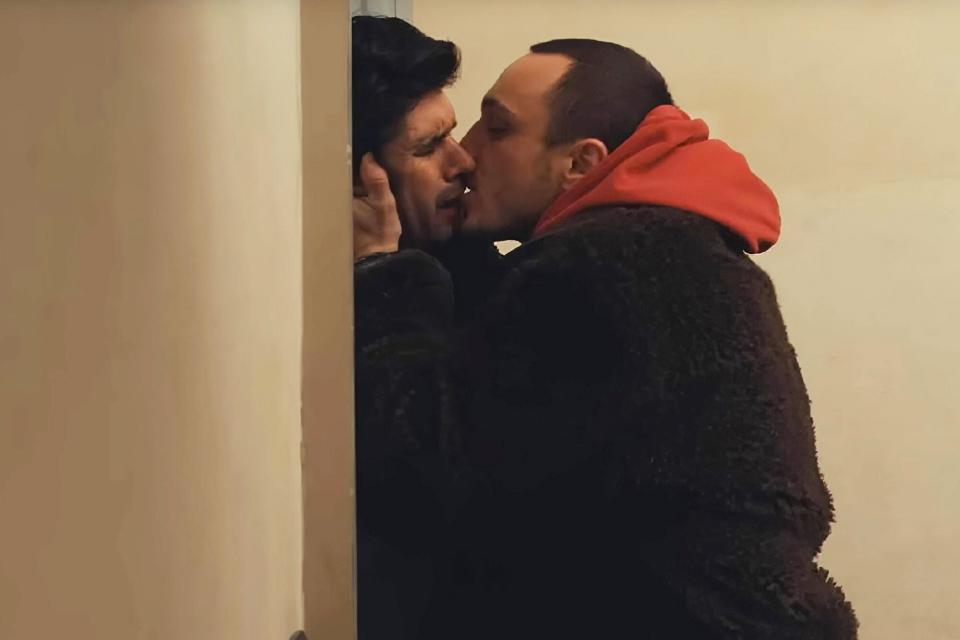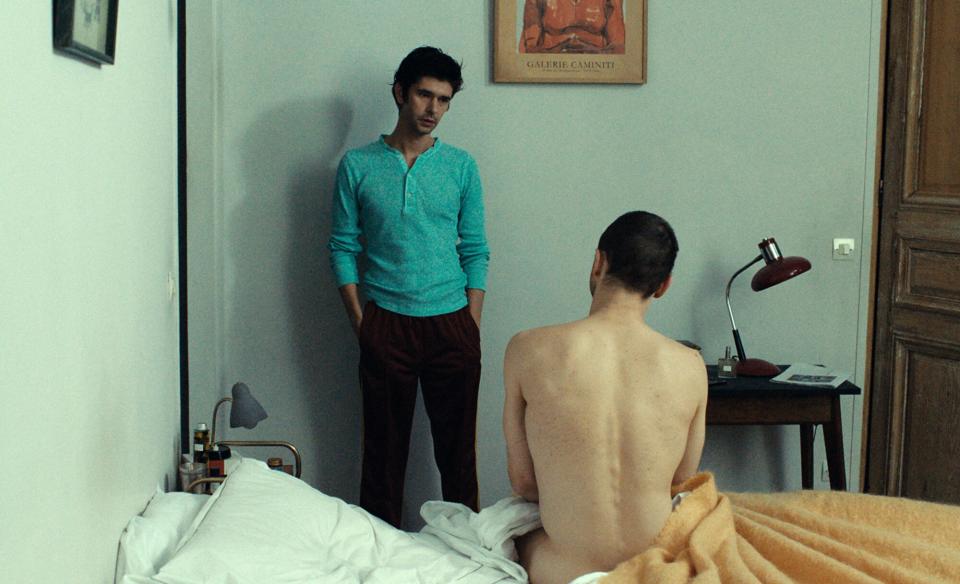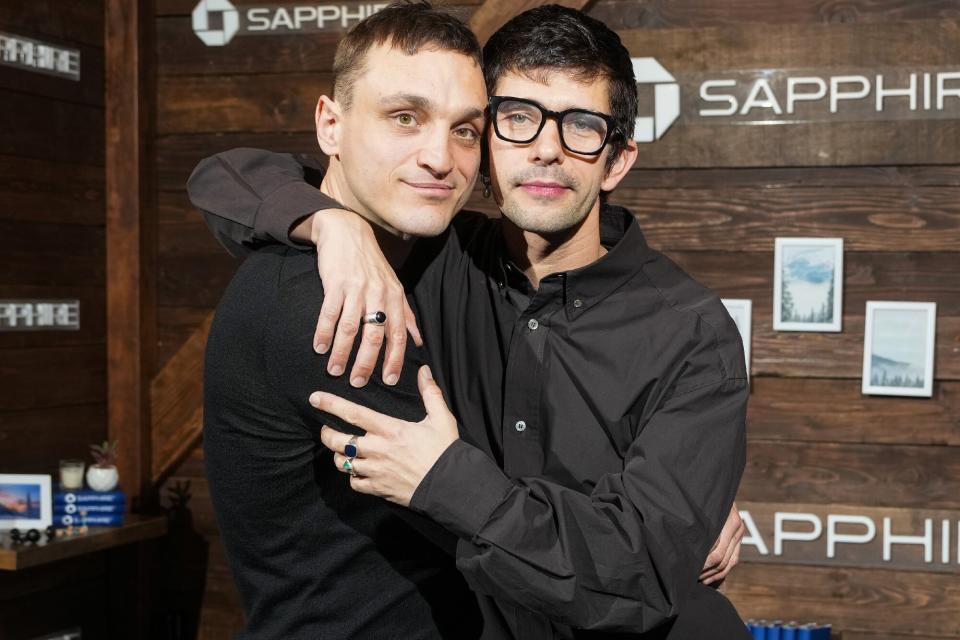How life under Trump, Rosemary's Baby , and Barbara Stanwyck inspired Passages
- Oops!Something went wrong.Please try again later.
- Oops!Something went wrong.Please try again later.
Warning: This article contains spoilers about Passages.
Since 1997's The Delta, Ira Sachs has set himself apart as a director with a unique voice in his meditative, personal films that feature an observational, documentary-esque approach. His latest, Passages, which he also co-wrote, is no exception — it uses his signature style to explore a complicated love triangle between filmmaker Tomas (Franz Rogowski), his longtime partner Martin (Ben Whishaw), and primary school teacher Agathe (Adèle Exarchopoulos). The three of them search for connection amidst their desire and Martin's yearning for a family.
Sachs, who coparents his children with his husband and the children's mother (and her husband), was in part inspired by his own life, but not as much as you might think. "That was a plot device, to be honest," he says, with a laugh. "The film is certainly personal, but it's not particularly autobiographical. I've made more autobiographical films than this one. In some ways, this is a film of observation and also a film of exploration of what it is to be a man with power, which I grapple with."
In a lot of ways, Passages is instead inspired by Sachs own fascination with cinema as a storytelling medium and the work of those who've come before him. The filmmaker speaks with EW about some of the movie's more striking visual passages and all the outside forces that influenced his work.

MUBI / Courtesy Everett Ben Whishaw and Franz Rogowski in 'Passages'
ENTERTAINMENT WEEKLY: What made you decide to explore the dynamic of this love triangle and the possibility of this coparenting arrangement in this way?
IRA SACHS: It was during the pandemic, and I felt longing for so many things that I couldn't have, and also an awareness of all the things that I did have. I thought the gap between those two seemed very dramatic. I wrote the film for Franz Rogowski. I had seen him in Michael Haneke's Happy End, specifically a scene in which he does a karaoke performance of Sia's "Chandelier." I was really turned on, and I was excited about the possibility of collaboration. I was also interested in a love triangle, which to me is like a heightened version of everyday desire. There's always someone missing something and that brings the whole film up to a place of passion.
Was there any version when you were writing it or figuring it out where it was going to work out and these three people were going to stick together?
No. This was always a film that in my mind began with a man on a pedestal and ended with a man on the floor. That's of the story of the film in a certain way. It was a little bit living under Trump and wanting to find vulnerability in male power. The film in some ways is acting out desire.
I wanted to ask about your use of red in the film, specifically with Martin's robe. Was that something your costume designer came to you with, or was it something that was in the script from the beginning?
I had a wonderful collaboration with Khadija Zeggaï, the costume designer. What we chose to do is to make a very realistic film in an unreal way. Inspiration were films like Goddard's Contempt, where what you remember and what lingers is the impact of color, as well as the pleasure of skin. I wanted to make a film filled with pleasure, and to do so, I tried to access every element of cinema that I enjoy the most, which is music, light, color, emotion, pain. All of those things become the texture of Passages.

Courtesy of Sundance Institute Ben Whishaw and Franz Rogowski in 'Passages'
You have very expressive framing and staging. I particularly love the scene in the bedroom where Martin and Tomas are arguing, and all we can see is the back of Tomas' head and he's blocked out Martin's face entirely. Can you walk me through what you wanted people to take away from that shot and the complexities of setting that up?
Well, I didn't set it up. It was an accident. In a way, what I'm doing when I'm shooting is I'm looking for accidents. I'm trying to create an atmosphere in which there is the potential for something extraordinary. At the same time, there's always the potential to fail. So, it's an atmosphere of risk. I'm also positioning the camera in a way in which it's observant, but can't intrude. So sometimes the intimacy going on between the actors excludes the camera in a way that is enticing. I think of the moment in Rosemary's Baby when Mia Farrow's sitting on a bed and there's a doorframe, and [director Roman] Polanski imagined the entire audience bending to try to look around the doorframe. I look at the camera as something like that where you're saying, "You're in the room, but you don't get to see everything." I love when films create metaphors, but I try to not think of metaphors when I'm making them.
I did find myself wondering if Agathe actually got an abortion, or if she was lying to Martin. Did you want us to have some skepticism there?
It did not occur to me, but I make films that are filled with ellipses and which conclude in open moments. The future, the past, and everything in between is filled with possibility. I want the audience to be engaged enough that they try to imagine the other directions that the story might go. I think of Robert Altman, a great filmmaker of democratic cinema in which any character might take hold of the story. We don't know who the hero is. That shifting is an atmosphere in which narrative shifts, but so does power.
You use the song "The End of a Perfect Day" as a leitmotif here, which is used very effectively in this 1940 Barbara Stanwyck, Fred MacMurray film Remember the Night. Why did you choose that song?
And the actor who sings the song in Remember the Night in that moment is this extraordinary character actor, [Sterling Holloway,] who was possibly gay and has this sensitivity, which is breathtaking. I watched that film; I watched a lot of movies during the pandemic. I discovered things that I'd never seen before, including Remember the Night. I found that scene with Barbara Stanwyck, and the song so incredibly moving. It's a direct lift from Remember the Night.
Sterling Holloway was also the voice of Winnie the Pooh for Disney.
That's funny because Ben Whishaw was the voice of Paddington.

Jack Dempsey/Shutterstock Ben Whishaw and Franz Rogowski
So, how you end up reaching out to Ben and landing him for this movie?
We became friends on Instagram. It was a shared interest in both each other's work and also in queerness and art-making and creativity and community. That was just being born when I finished the script for Passages, and so that was like the next step. Making the film has been a wonderful experience with Ben. We're working on a short film we're going to make in November, where he plays the photographer Peter Hujar. Passages was a particularly joyous set. Franz, I always thought of as an animal and Ben as a knife. Ben's extraordinary because he has this modesty which disappears in the moment of action.
As you said, this is very much a film about desire, and its sex scenes garnered an NC-17 rating, which both you and distributor MUBI have spoken out about. But in terms of filming them, are they very carefully choreographed? Is it more an observational thing as you're saying? What is your approach as a director to those moments?
You start with asking the actor what is his or her boundary, and then you proceed from there. There's no discussion until the boundary is stated about what an actor feels comfortable with. Then you come up with a strategic plan using bodies and camera that gives the actors the same kind of freedom that they have in all the scenes, which is the freedom to discover things. But within a set of conditions which have been agreed upon.
You said your films have open endings and can go any one of which ways, but Tomas really ruins both of these relationships by the end. Do you think he's learned from this and will take these lessons to heart going forward?
I can't answer that because I think it's really subjective. I do think the film ends on an open note, but also it's important as a maker to create a unified whole. So, there is completion, if not resolution.
Passages is now playing in theaters.
Want more movie news? Sign up for Entertainment Weekly's free newsletter to get the latest trailers, celebrity interviews, film reviews, and more.
Related content:

